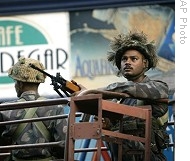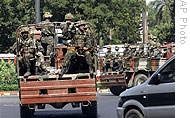voa标准英语2008年-Indian Forces Continue Battling Militants in Mu
搜索关注在线英语听力室公众号:tingroom,领取免费英语资料大礼包。
(单词翻译)
In an unprecedented1 response to a domestic terrorist attack, Indian military forces have taken over the battle against gunmen who plunged2 Mumbai, a city of 18 million, into confusion. The siege, at 13 locations, has claimed 104 lives and wounded as many as 300 people. State officials say six foreigners are among those killed. Indian commandos are battling to regain3 control of two luxury hotels and a Jewish center in Mumbai, after coordinated4 attacks by armed militants5. VOA Correspondent Steve Herman in our South Asia bureau in New Delhi has details. |
| Army personnel outside one of the famous eateries in Colaba, near the Taj Mahal Hotel, in Mumbai, 27 Nov 2008 |
India's financial capital saw commerce paralyzed and the city turned into a virtual war zone after police were outgunned by insurgents6 who held the city hostage.
The state's chief minister acknowledged that control had been ceded7 to the military and National Security Guards, a federal counter-terrorism group under the Home Ministry8.
Commandos stormed luxury hotels where terrorists had taken guests hostage. Air force helicopters flew overhead along the shoreline. Navy and Coast Guard vessels9 pursued a ship, identified as the MV Alpha, suspected of possibly bringing in the terrorists from Pakistan.
As night fell, 20 hours after the initial attacks, elite10 troops conducted a room-to-room search inside the Taj Mahal Palace and Towers, as well as the nearby Oberoi-Trident Hotel, for hostages and terrorists. The soldiers were joined by firefighters who battled intermittent11 blazes at both hotels.
Army Major General R.K. Hooda, the commanding officer of Maharashtra state, cautioned reporters not to speculate on how long it would take for troops to end the siege by the heavily-armed gunmen.
"Our effort is to ensure that we bring back all people who are inside safe and also capture or eliminate the terrorists violence," he said.
 |
| Indian commandos take positions close to where Jewish families have been taken hostage in Mumbai, 27 Nov 2008 |
Special rangers12 of an anti-hijacking squad13, who were flown into Mumbai, surrounded Nariman House, a residential14 and office building serving as the headquarters of an ultra-Orthodox Jewish outreach group. The rangers joined other special troops to try to free Israelis taken hostage by several gunmen.
A previously15 unknown group, Deccan Mujahideen, has claimed responsibility for the assault on Mumbai. One of the militants phoned an Indian television channel and expressed outrage16 over the deaths of Muslims in the disputed Kashmir region at the hands of the army.
News commentators17 here praised officials for dispatching elite units of Indian soldiers, sailors and airmen to battle terrorists in an urban environment.
 |
| Indian Army soldiers arrive in Mumbai, 27 Nov 2008 |
Police were criticized for a slow initial response to the Wednesday night shootings and grenade blasts. At one restaurant, popular with artisans and foreign travelers, which was sprayed with automatic gunfire, victims said police did not respond for 20 minutes.
Several of Mumbai's top law enforcement officers are being hailed as "martyrs18" for giving their lives while chasing gunmen, some of whom hijacked19 a police vehicle and opened fire on bystanders.
The attack is the worst in India since explosions on suburban20 Mumbai commuter21 trains in July 2006 which killed 187 people and injured 800 others. But this strike is far different than the wave of bombings, blamed on Muslim extremists or, occasionally ultra-right wing Hindus, which have mainly targeted working class markets. This attack focused on locations frequented by the elite and the gunmen made a deliberate effort to take hostage foreigners, especially Americans, Britons and Israelis. Among the reported dead, besides Indians, are nationals of Australia, Britain, Germany, Italy and Japan.




